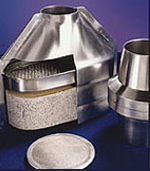
Microlith® technology offers multiple benefits for automotive and other internal combustion engine aftertreatment applications. The low thermal mass is especially important for quick catalyst lightoff in order to deal with automotive cold start emissions. The PCI catalytic converter can achieve greater conversion effectiveness per unit size material, with up to 20-fold reduction in volume and weight, as well as reduction in precious metal catalyst requirements, compared to long channel monoliths.
The combination in a passive converter of faster lightoff, smaller size, lower weight, increased effectiveness and lower cost is attracting significant interest from the automotive and marine industries. Prototypes have been tested with major U.S. engine manufacturers. A two stroke application of the technology is also being developed as well as a formaldehyde oxidation catalyst for reciprocating natural gas engines. Test results conducted on a 1.9L Ford Escort, in collaboration with Ford Motor Co., demonstrated emissions reduction that exceeds the Ultra Low Emission Vehicle standards (ULEV) (SAE Technical Paper # 971023). Durability has been proven through multiple “hot vibe” tests (950oC,28g’s, 100hz) and engine aging tests.
Contact PCI to learn more about how our solutions may be adapted for your needs.
Additional Publications
“Laboratory Evaluation of Ultra-Short Metal Monolith® Catalyst” SAE 980672.
“Development and Performance of Microlith® Light-off Preconverters for LEV/ULEV.” SAE 971023.
“Rapid Thermal Response Catalyst for Treatment of Automotive Exhaust” Materials Research Society, Symposium Proc. Vol. 454, 1997.
“Reduction of Formaldehyde Emissions from Pipeline Compressor Drivers” GRI-02/1035, Gas Research Institute.


